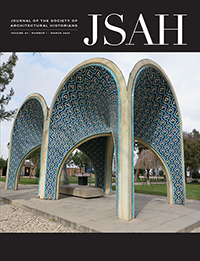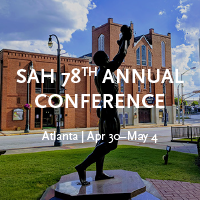-
Membership
Membership
Anyone with an interest in the history of the built environment is welcome to join the Society of Architectural Historians -
Conferences
Conferences
SAH Annual International Conferences bring members together for scholarly exchange and networking -
Publications
Publications
Through print and digital publications, SAH documents the history of the built environment and disseminates scholarshipLatest Issue:

-
Programs
Programs
SAH promotes meaningful engagement with the history of the built environment through its programsMember Programs
-
Jobs & Opportunities
Jobs & Opportunities
SAH provides resources, fellowships, and grants to help further your career and professional life -
Support
Support
We invite you to support the educational mission of SAH by making a gift, becoming a member, or volunteering -
About
About
SAH promotes the study, interpretation, and conservation of the built environment worldwide for the benefit of all
Program Date: Thursday, October 29, 2020
Supplemental Files:
Disability Studies Chat Text
Disability Studies and Architectural History Book List
Charles Thompson Memorial Hall Slides
NPS and Disability Rights Slides
Scholars of disability studies analyze the meanings attached to disability, including the devaluation of disabled bodies by popular culture, medicine, public institutions and architecture. Architectural norms restrict perceptions of the body as well as the lived experience of bodies in space. Presenters and participants will consider key concepts in research and pedagogical methods for integrating histories of disability and efforts to pursue disability justice in architecture. The discussion highlights the importance of disability activism as it relates to design.
This is not a technical explication of the Americans with Disabilities Act, but rather an open-ended opportunity to consider bodies, medicine, stigma, and space against the backdrop of the current global health emergency.
Gail Dubrow, professor of architecture and history at University of Minnesota, will moderate the discussion.
Participants:
-
Gail Dubrow, Laura Leppink, and Sarah Pawlicki, "Disability Justice and Public History: The Case of Thompson Memorial Hall, Saint Paul, MN"
-
Aimi Hamraie, "Knowing, Making, and Disability"
-
Perri Meldon, "Disability Rights and the National Park Service"
Speakers

[Image description: Gail Dubrow, a white woman with shoulder-length hair, faces the camera and wears a patterned scarf, black glasses, and earrings.]
Gail Dubrow (she/her) is Professor of Architecture and History at University
of Minnesota, where she teaches in Heritage Studies and Public History. She is the author of two award-winning books: Sento at Sixth and Main, with Donna Graves; and Restoring Women’s History Through Historic Preservation. Her most recent work,
with Laura Leppink and Sarah Pawlicki, explores strategies for engaging aspects of disability history at historic places. Their collaborative presentation in this SAH workshop builds on preparations for a graduate workshop on Disability Justice and
Public History planned for spring 2021 at University of Minnesota.

[Image description: Aimi Hamraie, an olive-skinned non-binary person with short, dark curly hair and rectangular glasses smiles slightly at the camera. They wear a blue shirt, blue and green plaid blazer, and stand in front of a blurred green background.]
Aimi Hamraie (they/them) is Associate Professor of Medicine, Health, & Society and American Studies at Vanderbilt University, where they also direct the Critical Design Lab. Hamraie’s book, Building Access: Universal Design and the Politics of Disability (University of Minnesota Press, 2017) offered the first critical history of the Universal Design movement in the United States, and was funded by the Graham Foundation for Advanced Studies in the Fine Arts. Hamraie is also host of the Contra* podcast on disability and design. More information at www.mapping-access.com.

[Image description: Laura Leppink, a white woman with blond hair and blue eyes wearing a dark blue blazer and flower pattern shirt smiles in front of a white wall.]
Laura Leppink (she/her) recently received her MA in Heritage Studies and Public History with an emphasis in Historic Preservation at the University of Minnesota, located on Dakota lands. Motivated by her work on the UMN Task Force on Building Names and Institutional History, she completed a joint capstone resulting in the creation of the Rename Reclaim Working Group, a coalition of students, alumni, faculty, staff, and community members dedicated to reckoning with the university’s history of discrimination. Her current work as a research assistant for Dr. Gail Dubrow on disability justice, public history, and placemaking combines her passion for activism through history work, with her continued advocacy for recognizing the power of place and preservation.

[Image description: Perri, a white woman with short brown hair, smiles at the camera and wears a sleeveless white blouse. She stands with foliage in the background.]
Perri Meldon (she/her) has worked with the National Park Service since 2017 as part of several projects to tell fuller stories of American places and people. She has written articles that introduce online audiences to themes in disability history and records oral histories with NPS employees as part of the “Telling Our Untold Stories: Civil Rights and the National Park Service” initiative. Mostly recently, she has assisted the Park History Program with laying the groundwork for a disability history and culture handbook to support parks and historic sites. As a PhD student in Boston University’s American and New England Studies Program, Perri examines federal land management through the lens of public and environmental history. Her work on memorialization and historic preservation has been featured in American Quarterly, the AAIHS Black Perspectives blog, and the AHA Perspectives Daily blog.

[Image description: Sarah Pawlicki, a white brunette with brown eyes wearing a dark blue blazer, black shirt, and a dark blue tie, smiles in front of a beige wall.]
Sarah Pawlicki (she/her) is a PhD. candidate in the University of Minnesota’s History department on Dakota lands. Her PhD. minors in Heritage Studies and Public History and Native American and Indigenous Studies inform her perspective on the importance of decentering hegemonic stories about history and building new ways to interpret the past. Her dissertation’s focus is on how seventeenth-century Indigenous and colonial beliefs about death informed their labor politics; however, she is excited and grateful to be working on diverse projects including one focused on disability histories and placemaking in her capacity as a research and teaching assistant for Dr. Gail Dubrow.

